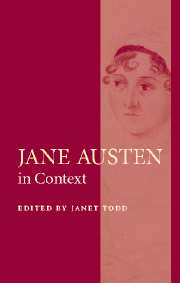35 - Psychology
Published online by Cambridge University Press: 19 December 2020
Summary
Any discerning reader can relish Jane Austen's psychological discernment. From a literary historical point of view, her achievement seems the more remarkable. In her apparent vindication of her chosen genre in Northanger Abbey, Austen described the fiction of predecessors like Frances Burney and Maria Edgeworth as conveying ‘the most thorough knowledge of human nature, the happiest delineation of its varieties’ (1:5). Yet a reader who comes to Burney's or Edgeworth's novels after Austen's is likely to think that their ‘human nature’ often excludes psychological probability. He or she would notice, in particular, that their heroines are models of feminine rectitude. They may be placed in difficult situations, and variously tricked or misinformed, but they do not exactly have faults. One useful way of understanding Austen's psychological subtlety is as an escape from models of the heroine offered by fiction before her.
Jane Austen was an avid novel reader and well aware of how her work might compare with the fiction of her predecessors or contemporaries. Usually when she refers to other novels or novelists in her fiction or letters it is in some spirit of satire. Just before she died, the new novel on which she was working was invigorated by the follies of novel readers just as Northanger Abbey had been. Sanditon sets in motion a sub-plot involving a character's laughable susceptibility to fiction. Sir Edward Denham, we hear, ‘had read more sentimental Novels than agreed with him’. He enthuses about his favourite works: ‘The Novels which I approve are such as display Human Nature with Grandeur – such as shew her in the Sublimities of intense Feeling – such as exhibit the progress of strong Passion from the first Germ of incipient Susceptibility to the utmost Energies of Reason half-dethroned.’ His ‘fancy’, we are told, ‘had been early caught by all the impassioned, and most exceptionable parts of Richardson’s’ (S, 8).
- Type
- Chapter
- Information
- Jane Austen in Context , pp. 377 - 386Publisher: Cambridge University PressPrint publication year: 2005



